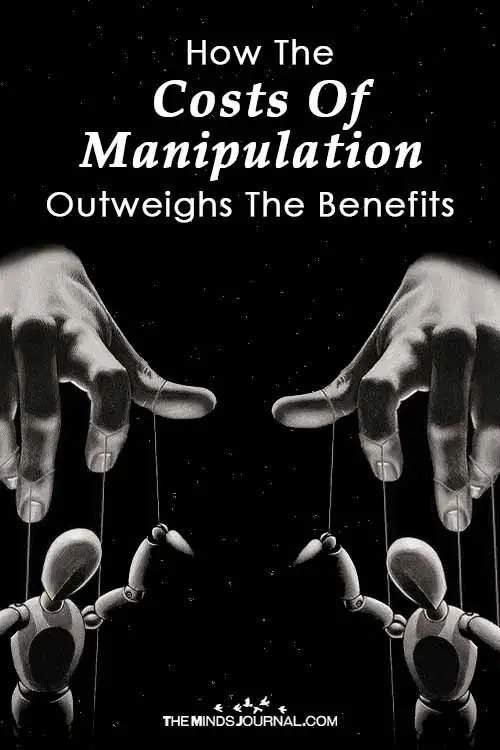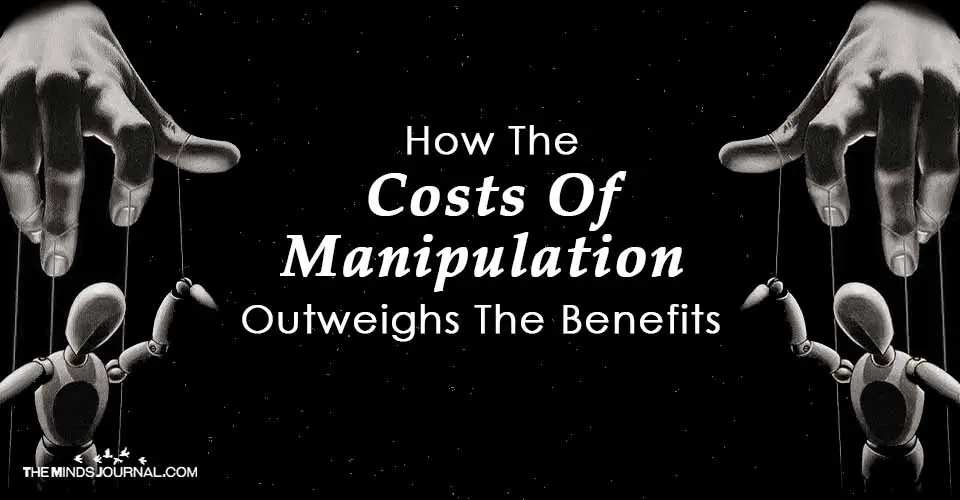The dictionary defines manipulation as “to influence or manage shrewdly or deviously or falsify for personal gain.”
No one likes to see themselves as a manipulator. But most of us, from time to time, engage in manipulative strategies in our efforts to fulfill certain desires or expectations that we have of others.
Related: 6 Tactics Manipulators Use To Control And Confuse You
Here are some examples of some of the ways that we may manipulate:
1. Intimidation
2. Shaming
3. Comparing
4. Threatening
5. Condemning
6. Self-pity
7. Insulting
8. Humiliating
9. Ridiculing
10. Belittling
11. Humor
12. Accommodating
13. Withdrawing
14. Criticizing
15. Blaming
16. Silence
17. Intellectualizing
18. Crying
19. Cajoling
20. Flattery
21. Bargaining
22. Bribing
23. Demanding
24. Sarcasm
25. Name-calling
26. Punishment
27. Playing dumb
28. Guilt-tripping
29. Judging
30. Raging
31. Whining
32. Distracting
33. Lecturing
34. Nagging
35. Nit-picking
36. Attacking
37. Seduction
Many of these behaviors are not intrinsically harmful and under certain circumstances even appropriate and legitimate. What determines whether or not one is being manipulative is not the behavior itself, but the context in which it is being used and the intention behind the action or words. An intention becomes manipulative when it is driven by an unstated, covert desire that is meant to mislead another person and influence their perception.
Related: Manipulation Of The Charming Narcissist
We manipulate when there is an outcome that we desire and we are more attached to achieving that outcome than we are to maintaining integrity in our relationship. Manipulation is what we do when we are not willing to risk openly acknowledging our intentions by expressing our desires. We feel less vulnerable when we use covert means to influence others to accommodate us.
While most of us are aware that manipulation in close relationships can diminish trust, we continue to practice manipulative behaviors.
Why then do we manipulate when we know better? And how do we justify this behavior to ourselves?
Manipulation, fueled with good intent, can be a blessing. But when used wickedly, it is the beginning of a magician’s karmic calamity – T.F. Hodge
Here are a few examples of some of the more commonly used rationalizations that we’ve heard from people over the years:
- Everybody does it.
- It’s harmless.
- I won’t get my needs met if I don’t.
- He/she does it and I’ll be at a disadvantage if I don’t.
- It’s not a big deal.
- It’s a habit and I can’t give it up.
- I don’t want anyone to take advantage of me.
You can add your own favorites to this list. Keep in mind that rationalizations aren’t equivalent to the truth. And in the case of relationships, there are “unintended consequences” that inevitably occur when we justify manipulations, regardless of the reasons we do it.
Those consequences of manipulation include:
- A diminishment in the level of self-trust and trust in the relationship
- An increase in feelings of anxiety (resulting from the fear of one’s deeper motives being revealed)
- Feelings of guilt and shame
- A diminishment in the quality of intimacy in the relationship
- An increase in feelings of resentment
- An increase in the frequency and intensity of arguments
- A loss of a sense of personal integrity
While we may feel manipulated at times when another person is using covert means to influence us, we are much less likely to be aware of these intentions in ourselves. Most of us are disinclined to recognize motivations in ourselves that are inconsistent with our image of ourselves as a “good” person. Consequently, we may be generally unaware of our manipulative tendencies. We usually manipulate because we fear that if we don’t fulfill our desires, we will suffer. We frequently don’t realize it when we are manipulating, and it is embarrassing to catch ourselves in the act.
“One of the methods of manipulation is to inoculate individuals with the bourgeois appetite for personal success – Paulo Freire
Examples of the desires that we seek to fulfill include (but are not limited to) acceptance, love, approval, sex, money, attention, security, support, agreement, control, and praise. In becoming more conscious of our manipulative patterns and the cost incurred, we can find the motivation to interrupt manipulative impulses. Then we can find the courage to risk outwardly acknowledging our needs and desires and make more direct requests to others.
The process of interrupting our manipulative impulses and restoring our integrity requires us to get honest with ourselves in regard to the whys and hows of our manipulative tendencies. Through a process of self-inquiry, we can bring into greater awareness the unconscious motivators that may be at play. Self-inquiry enables us to assert new, more effective practices to meet our needs and avoid the damaging consequences of manipulation.
Related: 4 Techniques To Control and Disarm a Manipulator
Here is an example of some questions that will help you to uncover some of your competing commitments and hidden desires. You may want to respond to these questions in writing or in dialogue with another person rather than simply thinking about the answers. With each insight into our deeper motivation, we become more empowered to act in ways that strengthen our commitment to integrity.
Each action that is expressed from this commitment deconditions the manipulative patterns that keep us separate from each other and ourselves.
1. How do I manipulate? (Examples of ways that you manipulate)
2. What am I looking for when I manipulate? (Examples of what I am seeking to get or experience)
3. What is the fear that drives me to manipulate? (Another way to ask this question is: “What is it that I am afraid of losing or not getting if I don’t manipulate?”)
4. What are the prices I pay for manipulating? (What are the negative consequences to you and your relationships?)
5. What would be required of me to stop manipulating? (What risks would you have to be willing to take in order to break this habit?)
6. What kind of support will be useful to me in my efforts to break the habit of manipulation?
7. Who are the people whom I can count on to support me in this process?
Such self-confrontation requires courage and commitment.
The tendency to avoid facing unpleasant truths about ourselves is strong in us all. Doing so can activate feelings of shame, humiliation, and guilt. Yet in coming to terms with these deeper feelings we can become more able to have a heightened experience of authenticity, intimacy, freedom, and passion.
Related: Surviving A Manipulator and Restoring Your Sanity
We don’t have to wait until we “arrive at our destination” to begin to feel the benefits of this process. The positive feelings emerge as soon as we commit ourselves to live more authentically and communicating more directly with the people with whom we seek to co-create a fulfilling connection.
The longer we practice, the easier it gets. It’s never too early or too late to make this commitment and to begin to enjoy the results of the process. See for yourself!
Written by Linda and Charlie Bloom
Originally appeared in Psychology today









Leave a Reply
You must be logged in to post a comment.